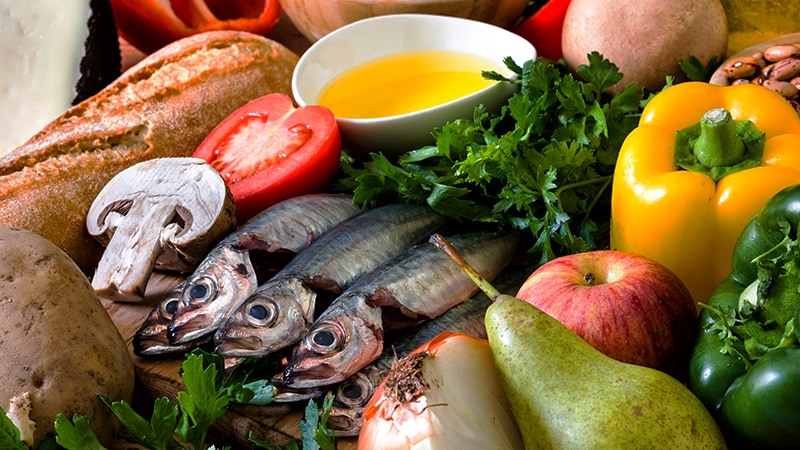TOPLINE:
In a 16-week randomized trial, following a Mediterranean diet significantly improved psoriasis severity and quality of life in patients with mild-to-moderate disease, independent of weight loss.
METHODOLOGY:Researchers conducted an open-label, single-blinded randomized trial, MEDIPSO, involving 38 patients (mean age, 46.4 years; 65.8% men) with mild-to-moderate psoriasis (Psoriasis Area and Severity Index [PASI] score, 2-10; mean score at baseline, 4.8) at a dermatology clinic in Madrid, Spain, from February 2024 to March 2025.Participants were randomly assigned 1:1 to a 16-week Mediterranean diet program with nutritional counseling, educational materials, and weekly provision of extra virgin olive oil or were given advice on following a standard low-fat diet without a dietician’s supervision (control group); 37 patients completed the study.All participants received a combination of a topical corticosteroid and calcipotriene once daily until complete lesion clearance, followed by twice-weekly application for maintenance.The primary outcome was the change in the PASI score from baseline to week 16, and secondary outcomes were adherence to the Mediterranean diet, anthropometric and metabolic parameters, inflammatory cytokines, and patient-reported outcomes.TAKEAWAY:At 16 weeks, the estimated marginal mean change in PASI among those on the Mediterranean diet was -3.4 compared with no change in the control group (between-group difference [BD], -3.4; P < .001). Of the 19 patients on the Mediterranean diet, 13 (68.4%) achieved a 50% reduction in PASI (PASI 50) compared with two of the 18 (11.1%) patients in the control group (P < .001). In addition, nine (47.4%) achieved PASI 75 (P < .001), five (26.3%) achieved PASI 90 (P =.46), and two (10.5%) achieved PASI 100 (P = .49) compared with none in the control group.Higher adherence to the diet was reported in the Mediterranean group (P < .001), and greater Mediterranean diet adherence strongly correlated with psoriasis improvement (P < .001).Participants receiving the Mediterranean diet had significant improvements in lipoprotein (a) levels (BD, -3.4 mg/dL; P < .04) and A1c levels (BD, -4.1 mmol/mol; P = .01); patient-reported outcomes also improved significantly with Mediterranean diet, including quality of life (BD, -3.1; P = .03), sleep quality assessed using the Insomnia Severity Index (BD, −2.5; P = .04), and anxiety scores (BD, −2.8; P = .01), whereas depression scores showed no significant change compared with the scores of those on the low-fat diet.There were no significant differences in waist circumference or body weight; total cholesterol, high-density lipoprotein, low density lipoprotein, apolipoprotein A1, or apolipoprotein B levels; and insulin resistance between the two groups.IN PRACTICE:
“These findings underscore the value of structured nutritional interventions as adjunctive therapy in psoriasis and highlight the need for larger, long-term studies to further define the role of diet in disease management,” the study authors wrote. The correlation between greater adherence with the Mediterranean diet and higher degree of improvement suggested a “causal relationship,” they noted.
SOURCE:
The study was led by Javier Perez-Bootello, MD, Hospital Universitario Ramón y Cajal, Madrid, Spain, and was published online on September 24 in JAMA Dermatology.
LIMITATIONS:
The study had a small sample size and an open-label, single-center design. Frequent contact with the intervention group could have influenced engagement. The 16-week duration limited assessment of long-term effects.
DISCLOSURES:
The study was supported by research grants from the Universidad Francisco de Vitoria and the Psoriasis Group of the Spanish Academy of Dermatology and Venereology. Perez-Bootello reported receiving nonfinancial travel support from UCB, Leo Pharma, Sanofi, Almirall, and La Roche-Posay outside the submitted work. Several other authors also reported receiving honoraria, personal fees, advisory fees, consulting fees, and funding from and being investigators, editors, or members of dermatology societies, councils, and various drug companies. Additional disclosures are noted in the original article.
This article was created using several editorial tools, including AI, as part of the process. Human editors reviewed this content before publication.


Dining and Cooking